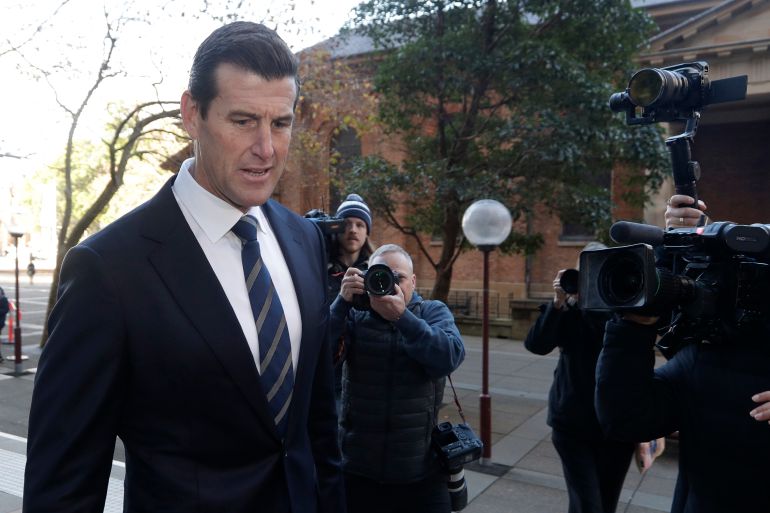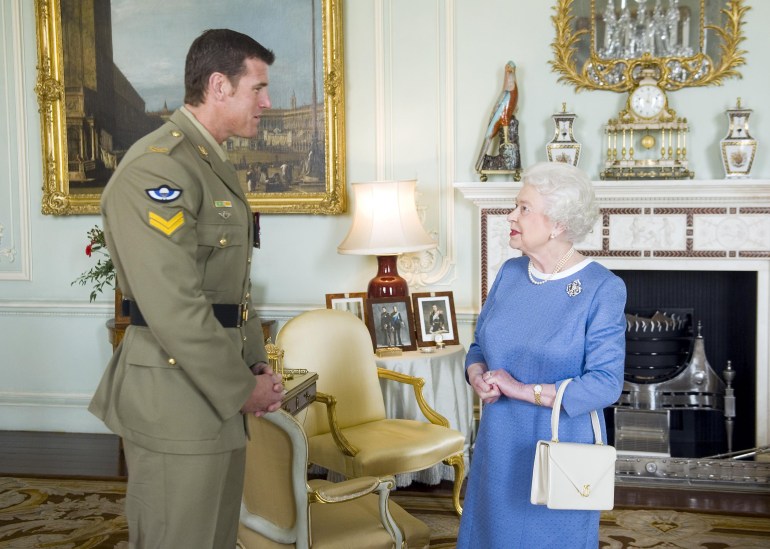Australia braces for ruling in Ben Roberts-Smith defamation case
Newspapers opted for the ‘truth’ defence after highly-decorated veteran Ben Roberts-Smith said their articles depicted him as a criminal who broke the moral and legal rules of military engagement in Afghanistan.

A judge in Australia will announce his judgement on Thursday afternoon in a defamation case brought by Ben Roberts-Smith, the country’s most decorated living soldier.
Anthony Besanko will start delivering his decision at 2.15pm (04:15 GMT) in Sydney’s Federal Court after Roberts-Smith sued three newspapers for defamation in the wake of a series of reports in 2018 that accused him of war crimes.
Keep reading
list of 4 itemsAustralia to close Afghanistan embassy over security fears
Australia finds evidence of war crimes in Afghanistan inquiry
Australian police raid ABC over 2017 Afghan report
The case transfixed Australia through 110 days of hearings that were delayed by the COVID-19 pandemic and ended with closing arguments in July 2022.
Proceedings involved more than 40 witnesses and are estimated to have cost as much as 25 million Australian dollars ($16.3m).
Here is what you need to know.
Who is Ben Roberts-Smith?
Ben Roberts-Smith was born in Perth in West Australia in 1978, and signed up for the Australian army when he was just 18, later completing two tours of East Timor.
He joined the elite Special Air Service Regiment (SASR) in 2003.
Deployed to Afghanistan multiple times between 2006 and 2012, Roberts-Smith was awarded the Victoria Cross, Australia’s highest honour, for his “most conspicuous gallantry in action in circumstances of extreme peril” during a mission in 2010 to track down a senior Taliban commander.
Roberts-Smith, who is divorced with twin teenage daughters, left the military 10 years ago and took a degree in business, later joining the Seven Network media group and becoming a motivational speaker.
Seven provided an initial loan to help fund the legal action, pitting it against rival media group Nine, which owns the Age and the Sydney Morning Herald.
The former soldier “sat masked and unreadable” at the back of the court throughout the hearings, the Sydney Morning Herald reported as the case closed.
The United Kingdom’s Guardian newspaper said Roberts-Smith sat in the same seat for each hearing with the bearing of an “impassive observer” even as witnesses – including dozens of serving and former soldiers as well as Afghan civilians – gave detailed testimony of his alleged brutality.
Why did he sue for defamation?
The Sydney Morning Herald, the Age and the Canberra Times newspapers in 2018 ran articles on the alleged killing of Afghan civilians by members of Australia’s special forces while deployed in the country in the years between 2009 and 2012.
As well as accusing Roberts-Smith of being complicit in the murder of six Afghans, the publications also alleged he bullied fellow soldiers and punched his former lover.
In bringing the case, Roberts-Smith said the articles damaged his reputation because they suggested he “broke the moral and legal rules of military engagement” and portrayed him as a criminal.
He said they also suggested he “disgraced his country and the Australian army”.

Denying the allegations, Roberts-Smith said he had been “greatly injured” by the articles’ publication and was seeking aggravated damages and costs.
He has not given a figure for the amount he was seeking.
Defamation laws in Australia have recently been amended to control the size of potential payouts but the Roberts-Smith case is being fought under an earlier law allowing for unlimited damages.
How has a defamation trial become about war crimes?
The Sydney Morning Herald and the Age both opted for the “truth” defence, which means they have had to prove to the judge that the allegations they printed about the soldier’s conduct were true – on a balance of probabilities. The burden of proof in the civil court is lower than in criminal cases.
“Because the principal defence here is truth, what the trial has become is a de facto war crimes trial,” David Rolph, a professor at the University of Sydney law school who specialises in media law, told the Reuters news agency.
In their initial filings, the publications cited the Geneva Conventions on the treatment of prisoners of war as well as on the protection of civilians in war, noting that Australia was a party to the conventions.
In one of the most searing allegations, witnesses for the newspapers told the court how in 2012, a handcuffed Afghan man in the village of Darwan was killed after Roberts-Smith kicked him off a cliff and then ordered two other soldiers to shoot him.
Roberts-Smith and another soldier gave evidence that the killing was lawful because the man was working for the enemy as a scout.
The defence has argued that soldiers who gave evidence against Roberts-Smith were gossips, motivated by greed and jealousy.
Thursday’s judgement comes amid a growing focus on the conduct of Australia’s military.
The landmark Brereton report, which was released in much-redacted form in 2020, found there was “credible evidence” members of the special forces had unlawfully killed 39 people while deployed in Afghanistan.
No soldiers were named in the report but it recommended 19 current or former members of the special forces be investigated by police over 23 incidents involving the killings of “prisoners, farmers or civilians” between 2009 and 2013.
An Office of the Special Investigator (OSI) was established and in March, it charged a 41-year-old former soldier with murder over the death of an Afghan man.
The OSI did not name the man but Australia’s public broadcaster ABC identified him as Oliver Schulz, a decorated former soldier with the special forces, who was shown in an investigation broadcast in March 2020 shooting an Afghan man lying on the ground.
He is the first serving or former member of the Australian military to be charged with war crimes and faces a life sentence if found guilty.